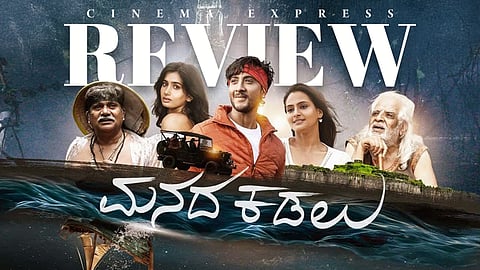Manada Kadalu Movie Review: Philosophically deep, but struggles to anchor emotionally
Manada Kadalu(3 / 5)
Yogaraj Bhat’s Mungaru Male remains one of Kannada cinema’s most iconic love stories, largely because it captured love in its pure, fresh, and chaotic essence. The monsoon rains, as the perfect metaphor for love, swept audiences away in their beauty and unpredictability, leaving a lasting impact on audiences. So, when Bhat returns with another love story, expectations are naturally high, especially considering how Mungaru Male still casts a long shadow over his career. But does Manada Kadaldu live up to the hype, or does it find a new path to explore the complexities of love?
Cast: Sumukha, Rashika Shetty, and Anjali Anish
Director: Yogaraj Bhat
This time, Bhat shifts his metaphor from the monsoon rains to the vast, unpredictable sea. If the monsoon was a symbol of love’s fresh start, the sea here becomes a reflection of the chaos, beauty, and uncertainty of life itself. Along with the sea and the coastal landscapes, the fort forms the emotional backdrop of the protagonist’s journey—a journey that is as much about discovering the self as it is about love.
The film opens with the meaningful song 'Neeli Neeli Kadalu', and the climax sees Sumukha's character underwater, followed by a narration in his voice. This MBBS student from Mysuru begins the story at a crossroads. His disillusionment with his studies and the loss of someone close to him disrupts his idealism. In search of purpose beyond the confines of medicine, he cuts short his studies and sets out on a quest to find deeper meaning in life—through nature and his relationships with others. This is where love enters the picture: a chance encounter with Rashika at the seashore, a cricketer dealing with a medical condition, sets the stage for a complex love story. For Sumukha, it’s love at first sight, but for Rashika, who is devoted to her sport, love is not on the agenda. Their dynamic speaks to the unpredictable nature of love—emotions don’t always align with circumstances.
Sumukha’s perseverance and his journey to win over Rashika leads him to Doni Durga, a coastal town where he meets Anjali, Rashika’s best friend. Anjali, an archaeologist, cautions Rashika about the complexities of love, but as the story unfolds, she too finds herself entangled in her own feelings for Sumukha. The result is a poignant love triangle, one that challenges Sumukha to question not just his feelings for both women but also his larger purpose in life. Should he prioritise love, or should he seek a broader sense of meaning?
What sets Manada Kadalu apart from Mungaru Male is its shift from romance as the central theme to a broader meditation on life and its purpose. The film asks a vital question: Is it enough to chase love, or should we aim to embrace life in its totality, accepting love as only one piece of a larger journey? In contrast to the simplicity of Mungaru Male, Manada Kadaldu is far more philosophical, urging reflection on the full spectrum of human experience.
While the film’s underlying message is thought-provoking, it doesn’t always land with the emotional weight it aims for. At times, the pacing feels uneven. In parallel, the story weaves in the significance of the fort with the history of a king who lived with two wives. There is an element of ancient healing through the character of Dattatreya, juxtaposing modern medicine with traditional knowledge. While this could have been a powerful way to address the complex nature of existence, these elements feel underdeveloped in the script. One subplot—Rangayana Raghu’s portrayal of an Adivasi character—feels tangential and underexplored, distracting from the central themes rather than enhancing them.
The performances, particularly from the newer faces, make a good attempt. Sumukha’s earnestness is engaging, and his enthusiasm is evident even in the happiest and saddest moments. However, there are times when a bit more depth and seriousness would have grounded his character more effectively. Anjali and Rashika bring sincerity to their roles, and all three contribute positively to the film's vision.
Yogaraj Bhat’s long-time collaborator Harikrishna’s music complements the emotional highs and lows, while cinematographer Santosh Rai Pathaje captures the breathtaking beauty of the sea, mountains, and lush greenery. These natural elements become as much a character in the film as the people themselves, contributing to the visual storytelling.
Manada Kadalu is not a film that will simply sweep you off your feet the way Mungaru Male did, and one should not expect it to. Instead, it’s a reflective journey about life’s complexities, the unpredictability of love, and the search for purpose. It challenges its audience to think beyond love's simplicity and consider our existence's larger meaning. It will be interesting to see how the younger generation understands it in all its forms. In the end, it’s not just about what we love, but how we live. So, is life more important than love? Or do we follow our hearts, no matter the path? For those willing to navigate the unpredictable, chaotic beauty of the seashore, Manada Kadalu is a journey worth taking once particularly for the fresh talents it brings to the forefront, offering a fresh take on Yogaraj Bhat’s exploration of love and life’s intricacies.

